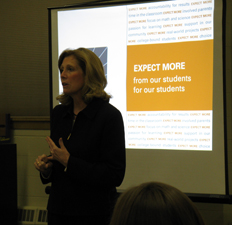 Dr. Cindy Fischer spoke at the Uplands Residential Association meeting Thursday night, November 12. She had been invited by Uplands resident Jennifer Brady to talk about the Peoria Charter School Initiative. Her presentation was similar to the one given at the Civic Center, except that there were no representatives of the Chicago Math and Science Academy (CMSA) in attendance.
Dr. Cindy Fischer spoke at the Uplands Residential Association meeting Thursday night, November 12. She had been invited by Uplands resident Jennifer Brady to talk about the Peoria Charter School Initiative. Her presentation was similar to the one given at the Civic Center, except that there were no representatives of the Chicago Math and Science Academy (CMSA) in attendance.
According to Dr. Fischer’s presentation, the charter school as proposed would have roughly the same demographics as the rest of District 150. Their plan is to recruit students from all parts of District 150, including the most impoverished areas. They’re committed to maintaining diversity. This was interesting to me because the district has long maintained that poverty is a root cause of low achievement. So I wondered why, given the same demographic makeup, the charter school promised to deliver such high performance. Dr. Fischer explained that the charter school would get better results because of the “best practices” that would be implemented and various other components of their program, such as a longer school day, higher teacher accountability, etc.
That all sounds great, but why isn’t District 150 doing that already? Dr. Fischer is not an outsider to District 150. She was in central administration. In fact, she was an Associate Superintendent. She was in a position of major influence. So, why didn’t she implement these “best practices” and other components when she was there? Are the practices only legal for charter schools to implement? Was she unable to enact changes because of resistance from others? Or did she only learn about these practices after retiring from the district?
I asked her those questions Thursday night. She explained that, in her position as Associate Superintendent, she wasn’t over curriculum and instruction for middle and high schools. She was over “everything else” — things like early childhood education, safety, etc. So she in fact wasn’t in a position to implement the kinds of reforms being discussed.
She also said that when she first came to the central administration building, she was ready to go in and make changes, but found that it wasn’t as easy as she thought it would be to make reforms. She said District 150 is “like a big ship,” and “before you can turn a big ship, you have to slow it down.” In keeping with that metaphor, she explained that she spent most of her time just trying to “slow down the ship” so reforms could be made.
Finally, Dr. Fischer explained that the proposed “best practices” are easier to implement in a charter school because you are “starting from scratch.” Since you’re building a new school from the ground up, you don’t have to change an existing culture. You can establish the kind of learning and working culture you want from the outset.
I have to say, Dr. Fischer was a very impressive speaker. My question didn’t rattle her at all. She didn’t sound or appear defensive in answering it, but spoke as professionally and engagingly as she had the rest of the evening. She also expertly avoided saying anything negative about District 150 teachers, union, administrative staff, etc., even as she spoke about the district’s low achievement scores. The board of directors made an excellent decision in appointing her the public face of the Peoria Charter School Initiative.
